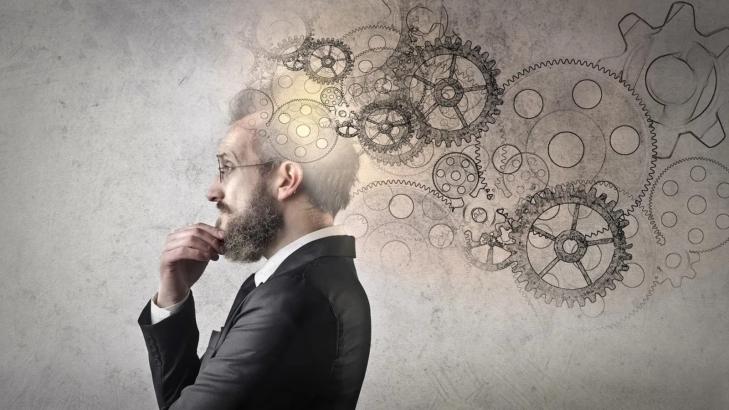The ability to think abstractly is very necessary to understand our world, which is becoming increasingly complex, transforming into a digital world, where our physical senses are not considered sufficient to lead us in the right direction.
Although abstract thinking is essential for making wise decisions in work and life, it is underappreciated.
Abstract thinking is based on our metacognitive ability; that is, our ability to understand our mental processes. Likewise, our metacognitive ability embodies the core of abstract thinking. Our senses cannot help us observe our mental processes. We must rely on abstract ideas, which are models of our mental processes, to understand our feelings and thoughts.
Developing our metacognitive ability is an excellent way to develop abstract thinking.
Developing Metacognitive Ability to Enhance Abstract Thinking
Have you ever been in a situation where you received constructive criticism, whether good or bad, from your boss, colleague, coach, or client? What did your intuition tell you to do at that moment? Did it tell you to be aggressive and shout at the other party? Or did it tell you to step away and withdraw? You may have refused to listen to that criticism as a result.

Fight, Flight, or Freeze Response
This is how behavioral scientists refer to it. This response, which some have dubbed the "saber-toothed tiger" response, indicates that our brains have evolved to deal with the threats that our ancestors faced in the natural world. The amygdala, a part of our brain that has undergone numerous adaptations to the natural world since the dawn of humankind, is one of the main brain regions responsible for this response.
The fight, flight, or freeze response is an essential part of one of the two thinking systems that roughly determine our mental processes. The old Freudian model of the id, ego, and superego_which has been debunked by recent research_does not correspond to this response.
The thinking systems are referred to as System I and System II by Daniel Kahneman, the winner of the Nobel Prize in Behavioral Economics. However, the terms "automatic system" and "deliberate system" are thought to describe these systems more clearly.
Developing your metacognitive ability involves making these two systems part of how you think about yourself and your mental processes. When you do so, you also develop your abstract thinking by thinking abstractly.
The automatic system matches our emotions, intuition, and thoughts, where we get the fight, flight, or freeze response. This system guides our daily habits, helps us make quick decisions, and allows us to react directly to serious life-or-death situations.
The Fight-or-flight Response in Modern Life
The fight-or-flight response is not appropriate for most aspects of modern life. Our automatic system interprets many minor stress situations that are not life-threatening as a fight-or-flight response, making our daily lives pointlessly stressful and detrimental to both our physical and mental health.
Furthermore, snap judgments based on intuition and emotions are usually quite accurate because they are quick, effective, and relieving when made. Our instincts frequently lead us to the right decisions, especially in circumstances similar to those our ancestors encountered.
Since many aspects of our modern environments differ from those of our ancestors, they were frequently in error. Working from the office will become less like their surroundings in the future as technology causes more disruptions, which will lead to systematic and predictable deviations from our paths.
The deliberate system reflects rational thinking and is centered in the cerebral cortex, the part of the brain that has evolved most recently. According to recent research, the cerebral cortex developed when humans began to live in larger social groups. This thinking system helps us deal with complex mental activities, such as managing individual and group relationships, logical thinking, abstract thinking, assessing possibilities, and learning new information, skills, and habits.
The deliberate system requires conscious effort to function even under mental stress, while the automatic system does not require any conscious effort. Fortunately, given adequate motivation and training, the deliberate system can be used when the automatic system is more prone to making systematic and predictable errors.

Deliberate Metacognitive Ability and Deliberate Abstract Thinking
Effective metacognitive ability involves confronting problems generated by our automatic system. Therefore, you need to identify errors. Doing so requires stripping yourself of your emotions and intuition. You must realize that your emotions will often deceive you even when you believe them true, as in the above example of constructive critical feedback.
Additionally, you must control your emotions and make them more aligned with reality. Perception and training are dependent on the deliberate system. By improving the deliberate system's capacity to guide the automatic system, you will develop your abstract thinking and metacognitive abilities.
We Don't Always Think Logically
We believe that we think logically and often use a deliberate system, but unfortunately, this is not the case.
Experts in this field have likened the automatic system to an elephant. It is by far the stronger and more widespread of the two systems. Our feelings frequently triumph over reason. Furthermore, since we spend most of our lives in automatic system mode, our intuition and habits control most of our lives. This is a good thing because considering every action and decision will be psychologically exhausting.
The deliberate system is comparable to an elephant rider, as they steer the elephant in any direction to reach their destination. Likewise, the deliberate system directs us toward our true goals. It is certain that the part of the brain in charge of the deliberate system is enormous, impractical, and slow to adapt and change. It also flees when it senses danger, but we can train it. You can gradually alter your automatic thought, emotion, and behavior patterns using the deliberate system to help you make better decisions.
It is important to realize that these two systems are contradictory and inconsistent with our conscious self-perception, where our mind seems to be a cohesive unit. Unfortunately, this self-perception is simply a convenient myth that we believe helps us get through our days. Our sense of self-perception results from multiple complex mental processes within the automatic and deliberate systems.
It takes time to incorporate this outcome into your mental model and that of others; that is, realizing how your mind works. The bottom line is that you are not who you think you are. The conscious part reflects yourself like a rider guiding that enormous elephant of thoughts and feelings.
If you wish to know the difference between automatic stress and deliberate stress in real life, think about the last time a supervisor, client, or investor gave you constructive critical feedback. Did you find it easier to take the criticism seriously and listen to it than to stand up for yourself and your work? If you did this, it indicates that you are fighting the urges of your automatic system with your deliberate system, using your willpower.
For another example, consider the last time you had a personal argument with a loved one or disagreed with someone online regarding a specific subject. Did that help you resolve things? Did you succeed in persuading the other person?
It would be amazing if you could do so. Arguments are often pointless, and even when we win an argument, we often end up hurting the relationships that are important to us. It's similar to acting in a way that harms yourself and others out of anger, which is never a good idea.
You may feel regret for some of the personal arguments you got into when you look back, but why did you get involved in the first place? It's a fight response, and it's unclear whether it will hurt you directly.

This is similar to behaving impulsively and without thinking, whether in a personal or professional setting. Luckily, this will be the easiest issue to solve. When we act in ways that do not align with our unique capacity for reason, scientists refer to these circumstances as the akrasia effect, which is characterized by a lack of self-control or a state of conduct and an inability to make the best decisions. In other words, we act irrationally, which goes against behavioral science's self-reflective goals.
What If Intuition Helped Us Make Many Good Decisions?
It is wise to be wary of absolutes, as research indicates that intuition can occasionally be useful when making decisions. In other words, it makes sense to trust your gut. Learning when to trust your intuition and when not to is crucial to developing your metacognitive skills.
For example, having experience with a subject receiving prompt, accurate feedback on your assessments might enable your intuition to detect relevant cues. More objective metrics need to be more clear to differentiate them. We have some pretty good intuition about learning styles. Direct feedback on decision-making helps us develop high-quality experiences by improving our ability to identify those styles.
Another example: If you have worked with someone for a while and observe negative behaviors while implementing a new project, it's time to investigate some finer details. In the past, our ancestors judged other people based only on their natural instincts.
However, don't think that you can tell lies from facts. Research indicates that humans struggle to distinguish between false and true statements. According to research by Charles Bond and Bella DePaul, humans can only detect 54% of lies on average. This is surprising because, if we tried this randomly, we could detect 50% of lies.
Generally, always following your intuition is never a good idea. Even when you think you can rely on it, it is better to use your instincts as a warning sign of potential danger and assess the situation analytically.
For example, suppose a long-time coworker recently received bad news about their family. Because of their behavior, you may not have fully comprehended the circumstances. If a situation changes and you find yourself using your intuition in a different setting, your extensive experience in that area could ruin the moment and make you uncomfortable.
In Conclusion
To get along and thrive in this world, you need to develop your abstract thinking, which means developing your ability to think about the world through frameworks and models. To do so, you need to develop your metacognitive ability, that is, your ability to understand and effectively manage your mental processes, including your thoughts and feelings.
The answer to do so involves the automatic and deliberate systems' abstract thinking framework. You must strip yourself of your emotions, avoid following your intuition, use your automatic system, know when it leads you in the wrong direction, and train it to take you in the right direction instead of using your deliberate system.






Add comment